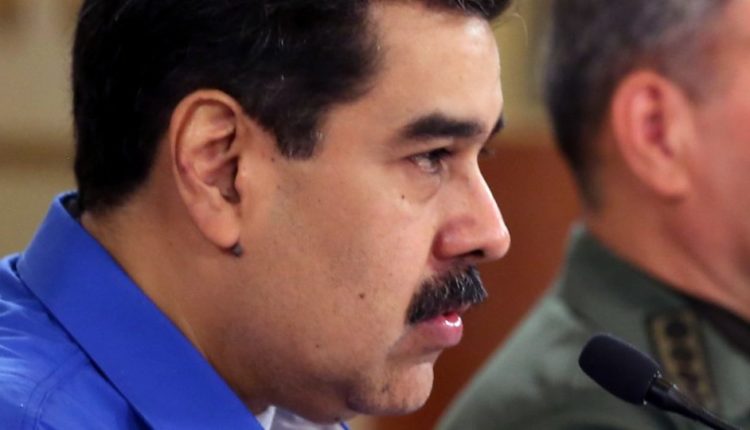Venezuela’s President Nicolás Maduro claimed to have defeated what he called a military coup attempt by the opposition leader, Juan Guaidó.
Dozens of National Guardsmen sided with the opposition in clashes on Tuesday that injured more than 100 people.
But in a defiant TV address, President Maduro said Mr Guaidó had failed to turn the military against him.
Mr Guaidó insists that Mr Maduro has lost control of the armed forces, and that a peaceful transition is at hand.
The opposition leader appealed for his supporters to take to the streets of Venezuela again on Wednesday.
Mr Guaidó has been recognised as interim leader of Venezuela by more than 50 countries, including the US, the UK and most in Latin America.
But Mr Maduro, backed by Russia, China and the top of the country’s military, has refused to cede leadership to his rival.
What did Mr Maduro say?
In his televised address, flanked by military commanders, Mr Maduro accused protesters of “serious crimes” which he said would “not go unpunished”.
Both the president and Mr Guaidó have called on their supporters to take to the streets, setting up more potential violent unrest in a nation already beset by economic crisis, chronic power cuts and widespread food shortages.
Mr Maduro lashed out again at the United States, which he accuses of plotting against him. He dismissed a claim by US Secretary of State Mike Pompeo that he had a plane ready on the tarmac to take him to Cuba, a staunch supporter of the beleaguered president.
“They had an airplane on the tarmac,” Mr Pompeo said. “He was ready to leave this morning [Tuesday], as we understand it. Russians indicated he should stay.”
What happened on Tuesday?
A three-minute video by Mr Guaidó published in the early hours of Tuesday showed him standing alongside a number of men in military uniform. He announced that he had the support of “brave soldiers” in the capital, Caracas.
He urged Venezuelans to join them in the streets, and appeared alongside another opposition leader, Leopoldo López, who had been under house arrest since 2014.
Supporters on both sides then gathered in different places of Caracas throughout the day, and there were clashes between Mr Guaidó’s supporters and armed military vehicles.
Protesters were also seen throwing rocks, but being repelled by tear gas and water cannon. At one stage a military vehicle was captured on video driving into protesters.
Mr Guaidó, the president of the opposition-controlled National Assembly, has called on Venezuela’s military to back him ever since he declared himself interim president in January.
He argues that President Maduro is a “usurper” because he was re-elected in polls that had been widely disputed.
Tuesday marked the most violent episode of the Venezuelan political crisis this year. Venezuelan health officials said 69 people were injured in the clashes, including two with bullet wounds.
Broadcasts from a number of news agencies, including the BBC and CNN, were apparently suspended amid the violence.
Later on Tuesday, it emerged Mr López had sought safety in the Chilean, then the Spanish embassy, along with his family.
The US Federal Aviation Administration (FAA) issued an emergency prohibition against all US carriers flying below 26,000ft in Venezuelan airspace.
It also said all US operators should leave the country within 48 hours, due to increasing political instability.
A failure, or more to come?
Tuesday’s events were definitely dramatic. But it is not clear where they leave Venezuela. Juan Guaidó made a bold move by saying the armed forces were on his side and the fact that Leopoldo López stood beside him was also big surprise. Who had freed him and what did that say about the loyalties of the armed forces?
But as the day went on, doubts began to surface – who exactly was backing the so-called uprising? We still do not have the answers.
Mr Guaidó’s video on Tuesday night, calling for people to come out onto the streets again, was a motivational pep talk that felt hollow. He claims Mr Maduro has neither the support nor the respect of the armed forces, yet clearly the generals at the top – whose support Mr Guaidó needs – are not on the opposition’s side either.
This is seen by many as another failed attempt by the opposition to take power. Yet, although Mr Maduro still occupies the presidential palace, his future is not secure either – he summed up the day as “intense” in a lengthy address but there is no question both sides will be feeling the heat after Tuesday.
How did the international community react?
UN Secretary General António Guterres has appealed for both sides to avoid violence. The US reiterated its support for Mr Guaidó.
President Donald Trump said he was monitoring events in Venezuela “very closely” and said the US stood with the Venezuelan people and their freedom.
He also threatened to implement the “highest-level sanctions” and a “full and complete embargo” against Cuba unless its military immediately ceased its support of Mr Maduro.
Governments who still support Mr Maduro, including Bolivia and Cuba, condemned Mr Guaidó’s efforts as an attempted “coup d’etat”.
The Mexican government expressed “concern about a possible increase in violence” while Colombian President Ivan Duque urged the Venezuelan military to stand “on the right side of history” against Mr Maduro.
An emergency meeting of the Lima Group of Latin American countries has been scheduled for Friday.
Source: BBC


Comments are closed.